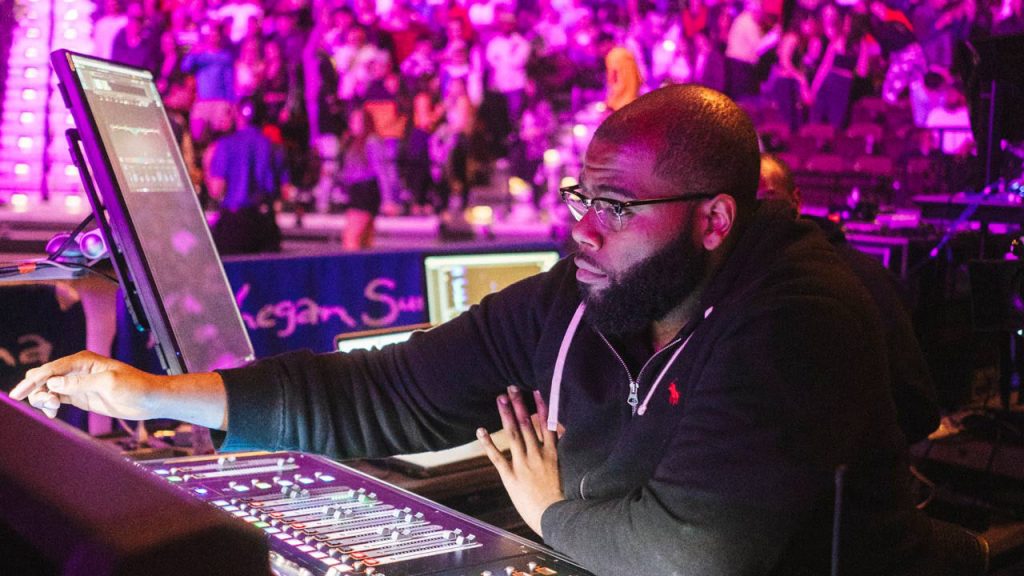FOH and Monitor Engineer Brandon Blackwell has chosen products from Waves Audio, including MultiRack SoundGrid, Waves SoundGrid Extreme Server and Waves Plugins for A$AP Rocky’s Injured Generation Tour.
Blackwell described his setup: “I spec’ed a DiGiCo SD12 which sounds phenomenal! To go with the console package, I added a Waves Extreme Server running plugins on an external computer via Waves MultiRack, which has been super helpful because it frees up the master screen of my console. Everything is sync’ed from the audio console to the host computer, which makes life so much easier; especially because I rely heavily on snapshot scenes.”
He added, “The production has changed a decent amount since the last time I mixed for A$AP Rocky, which was in 2015. During that time we were using a couple of DJ rigs for our playback source. But for the Injured Generation tour, we went to a 10-channel Ableton playback setup with stems, which has given me the control I always wanted, as there’s usually a lot going on in Rocky’s tracks. In terms of production, on the previous tour, we had a minimum of six performers on stage at one time. For this run, it is just Rocky on stage with hype-man A$AP Twelvyy on the side of the stage.”
About using Waves plugins, Blackwell commented, “All of our show vocals run through basically the same chain, while Rocky’s are a little different with the added outboard gear. For Rocky, the channel first goes to Insert-A, which is Waves MultiRack, where I first have the R-Channel plugin. Here I am doing EQ, high-passing and light gating. I love the way the gate sounds; it’s so natural that you can’t really hear it open or close. I use this especially when Rocky is on the B-Stage in front of the PA. It gives me a little more gain before feedback.
“After the R-Channel is the F6 Floating-Band Dynamic EQ with the visual RTA, which takes care of all the dynamic vocal changes. Rocky can go from talking to the crowd into rapping a song, singing a ballad and then screaming at the top of his lungs! All of those dynamic changes, plus sometimes cupping the microphone, would lead me to chase EQ all night long.
“Having F6 lets me shape his voice for all of those variables. I use the F6 a lot. One of the last places you will find it is on my ‘All Music’ sub-group. This is where I sidechain my ‘All Vocal’ sub-group and use the external source to carve space within the music. My thought process on mixing vocals is that you shouldn’t just use amplitude to put them on top of the music, but create the space for them with subtractive dynamic EQ. In my opinion, the key to a massive wall of sound is using every frequency that we can hear.”
He added: “There are a few other plugins being used for very specific technical tasks and taste. On my record bus, I have the SSL G-Master Buss Compressor and the L3 Multimaximiser. The SSL Comp has always been my go-to on outputs including IEMs, so I added it to my record bus to get it punchy and warm. I am not doing much reduction because the L3 follows it to get the mix louder!
“On my d&b E8 near-field monitors, I have the Q10 Equalizer for correction and to flatten them out. I tend to throw a decent amount of delays. One delay to match the record, and another to have a little fun and keep the crowd on their toes. I am also using H-Delay, and it’s been my go-to. I can have multiples of them set up for 1/4 and 1/8 notes and just tap the host tempo and all of my delays are in time.”
Blackwell remarked, about engineering the show. “I’m always on pins and needles right before the show. Once I hear the cue for house lights and music, all I am waiting for is to hear his vocal. That is the start of my race! After that, I can sit back and get comfortable. I sometimes walk away from the console and go into the crowd to make sure everyone is hearing close to what I’m hearing at FOH. That’s when I’m at my happiest because you can just see the joy on people’s faces. I am so blessed to have the opportunity to be even a tiny part of their happiness.”


